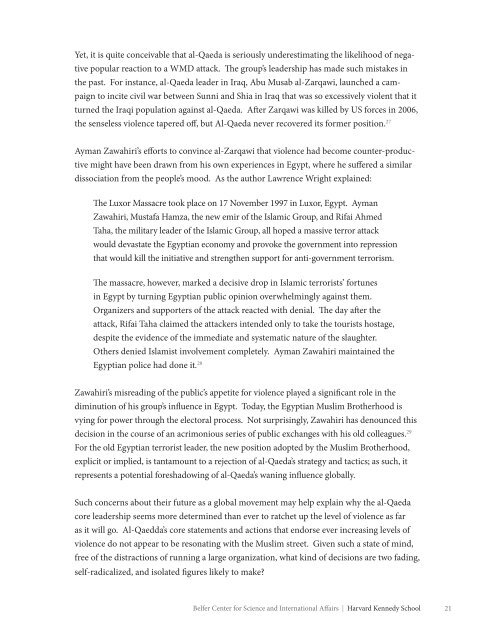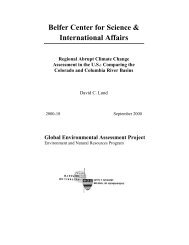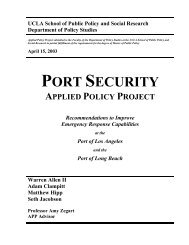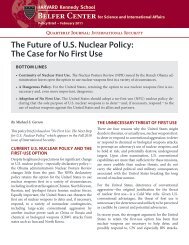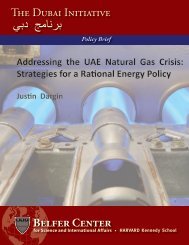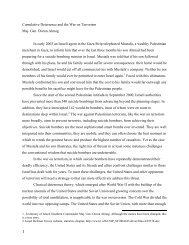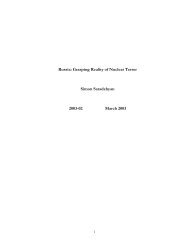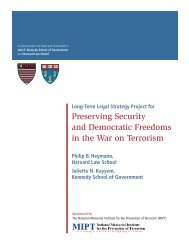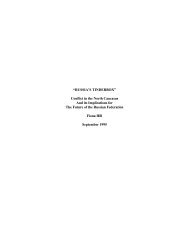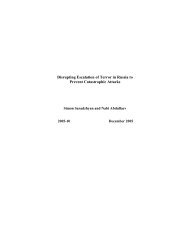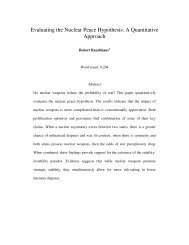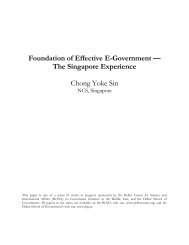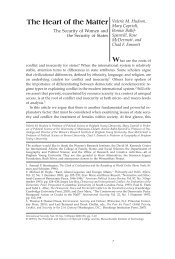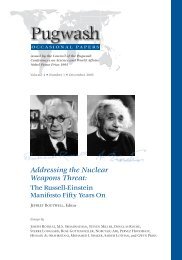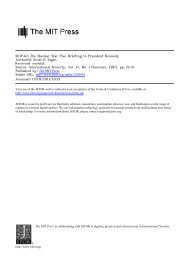Islam and the Bomb - Belfer Center for Science and International ...
Islam and the Bomb - Belfer Center for Science and International ...
Islam and the Bomb - Belfer Center for Science and International ...
Create successful ePaper yourself
Turn your PDF publications into a flip-book with our unique Google optimized e-Paper software.
Yet, it is quite conceivable that al-Qaeda is seriously underestimating <strong>the</strong> likelihood of nega-<br />
tive popular reaction to a WMD attack. The group’s leadership has made such mistakes in<br />
<strong>the</strong> past. For instance, al-Qaeda leader in Iraq, Abu Musab al-Zarqawi, launched a cam-<br />
paign to incite civil war between Sunni <strong>and</strong> Shia in Iraq that was so excessively violent that it<br />
turned <strong>the</strong> Iraqi population against al-Qaeda. After Zarqawi was killed by US <strong>for</strong>ces in 2006,<br />
<strong>the</strong> senseless violence tapered off, but Al-Qaeda never recovered its <strong>for</strong>mer position. 27<br />
Ayman Zawahiri’s ef<strong>for</strong>ts to convince al-Zarqawi that violence had become counter-produc-<br />
tive might have been drawn from his own experiences in Egypt, where he suffered a similar<br />
dissociation from <strong>the</strong> people’s mood. As <strong>the</strong> author Lawrence Wright explained:<br />
The Luxor Massacre took place on 17 November 1997 in Luxor, Egypt. Ayman<br />
Zawahiri, Mustafa Hamza, <strong>the</strong> new emir of <strong>the</strong> <strong>Islam</strong>ic Group, <strong>and</strong> Rifai Ahmed<br />
Taha, <strong>the</strong> military leader of <strong>the</strong> <strong>Islam</strong>ic Group, all hoped a massive terror attack<br />
would devastate <strong>the</strong> Egyptian economy <strong>and</strong> provoke <strong>the</strong> government into repression<br />
that would kill <strong>the</strong> initiative <strong>and</strong> streng<strong>the</strong>n support <strong>for</strong> anti-government terrorism.<br />
The massacre, however, marked a decisive drop in <strong>Islam</strong>ic terrorists’ <strong>for</strong>tunes<br />
in Egypt by turning Egyptian public opinion overwhelmingly against <strong>the</strong>m.<br />
Organizers <strong>and</strong> supporters of <strong>the</strong> attack reacted with denial. The day after <strong>the</strong><br />
attack, Rifai Taha claimed <strong>the</strong> attackers intended only to take <strong>the</strong> tourists hostage,<br />
despite <strong>the</strong> evidence of <strong>the</strong> immediate <strong>and</strong> systematic nature of <strong>the</strong> slaughter.<br />
O<strong>the</strong>rs denied <strong>Islam</strong>ist involvement completely. Ayman Zawahiri maintained <strong>the</strong><br />
Egyptian police had done it. 28<br />
Zawahiri’s misreading of <strong>the</strong> public’s appetite <strong>for</strong> violence played a significant role in <strong>the</strong><br />
diminution of his group’s influence in Egypt. Today, <strong>the</strong> Egyptian Muslim Bro<strong>the</strong>rhood is<br />
vying <strong>for</strong> power through <strong>the</strong> electoral process. Not surprisingly, Zawahiri has denounced this<br />
decision in <strong>the</strong> course of an acrimonious series of public exchanges with his old colleagues. 29<br />
For <strong>the</strong> old Egyptian terrorist leader, <strong>the</strong> new position adopted by <strong>the</strong> Muslim Bro<strong>the</strong>rhood,<br />
explicit or implied, is tantamount to a rejection of al-Qaeda’s strategy <strong>and</strong> tactics; as such, it<br />
represents a potential <strong>for</strong>eshadowing of al-Qaeda’s waning influence globally.<br />
Such concerns about <strong>the</strong>ir future as a global movement may help explain why <strong>the</strong> al-Qaeda<br />
core leadership seems more determined than ever to ratchet up <strong>the</strong> level of violence as far<br />
as it will go. Al-Qaedda’s core statements <strong>and</strong> actions that endorse ever increasing levels of<br />
violence do not appear to be resonating with <strong>the</strong> Muslim street. Given such a state of mind,<br />
free of <strong>the</strong> distractions of running a large organization, what kind of decisions are two fading,<br />
self-radicalized, <strong>and</strong> isolated figures likely to make?<br />
<strong>Belfer</strong> <strong>Center</strong> <strong>for</strong> <strong>Science</strong> <strong>and</strong> <strong>International</strong> Affairs | Harvard Kennedy School 21


